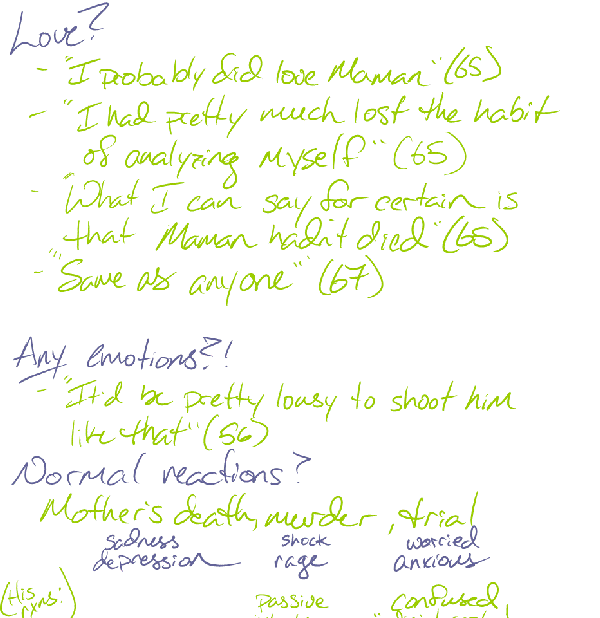During what turned into “storytime” on Monday, we looked at Ursula K. LeGuin’s short story, “The Ones Who Walk Away From Omelas.” Finish the story. We’ll discuss it tomorrow.
We’ll have a discussion of conformity tomorrow and seek answers to questions of equality, specifically: What is the overlap between a society that values conformity above all things and a society that values equality above all? Is there any overlap? Michel de Montaigne, considered by many to be the father of the modern essay (now you know who to blame), says of conformity:
Once conform, once do what others do because they do it, and a kind of lethargy steals over all the finer senses of the soul.
Which, of course, raises the question: What are the “finer senses”? (See Kurt Vonnegut’s “Harrison Bergeron“) After freeing himself from the equality devices, Bergeron dances with the prima ballerina. Can we make the argument that the arts are made possible by these “finer senses” and thus non-conformity or rebellion? Of course, Bergeron also declares himself “a greater ruler than any man who ever lived!” So there’s the wrench in that analysis. Thoughts?
Your homework for this weekend is to keep reading Brave New World (reading journal=friend) and finish Harlan Ellison’s “‘Repent, Harlequin!’ Said the Ticktockman.” First question: What’s with the jellybeans? I leave you to come up with other questions that pop up.
Bonus reading: Ursula LeGuin’s “The Ones Who Walk Away From Omelas.” This is a quick read, but a very haunting story. Read it if you so desire, but we will be focusing on Brave New World and Ellison’s story in class on Monday.
P.S. If for any reason you have trouble opening Ellison’s essay, download a free PDF reader or read LeGuin’s story. Discussion is impossible if we’re not all on the same page.
…involving faces without lips, raised eyebrows, and tight frowns. Thanks guys.
We went over the plans for each of your essays last week. Continue sorting through the quotations from your books, and we’ll begin thesis statements/essay building next week. If you haven’t begun collecting quotations, you have an extra hour today!
See you Monday.
This is just getting annoying.
Because I was not present for your discussion yesterday (which I heard was excellent; you all rock. Truly.), I can only guess how far you got, so here’s the plan:
- Finish the questions from yesterday (if you missed any).
- Take a closer look at the final lines of the book:
- Why does Mersault want to be “rid . . . of hope”?
- What is “the gentle indifference of the world”? Does this explain his attitude toward his trial, the death of his mother, the help from other people, etc?
- He wants “a large crowd of spectators” to “greet [him] with cries of hate” at his execution?! Discuss.
- How does this tie into our theme of identity? That is, how do you think Meursault (spelled it incorrectly yesterday—my bad) would identify himself? Better yet, what if Okonkwo, Holden Caulfield, Jim Nightshade and Will Halloway, Eugene Henderson, Meursault, and Viktor Frankl met? (J. VDW and E. Mc, insert your main character’s names into the list.)
- Start with Frankl. What makes a man’s life meaningful? If you’re reading Man’s Search for Meaning, briefly explain Frankl’s philosophy on meaning. If you’re not, discuss how your character would react to this philosophy.
- As a group, decide which of your characters have similar outlooks on life, and who does not. I’ll get you started: If Okonkwo met Henderson (same continent; different times, different locations, but bear with me), it would probably end in bloodshed. Henderson’s, that is. Though he seemed to get along well with King Dhafu, right? Hmm…
- If you finish this (you won’t, but I’d like to mention this anyway), begin working on your essay topics. We have around two weeks left in the session, so I recommend starting now. Send me an email with your ideas if you want/need help.
I’ll see you all tomorrow. Even if I have to set up a webcam, I’ll see you tomorrow.
Sorry guys.
Yesterday we discussed Mersault’s interrogation and trial. We focused, as did his interrogators, on the lack of emotion he showed during his mother’s funeral. While there was much debate as to whether he did not care or was simply lacking “the trappings and the suits of woe,” I believe we came to the consensus that he was not reacting “normally” to the situation, whatever the cause.
We also discussed the fact that nearly everyone he interacts with is trying to help him in some way, but he either outright rejects the help or ignores the offer. (See specifically the Inspector and the Chaplain’s attempts to “help” Mersault.)
My questions to you today:
- What types of things does he most often think about? (The future/the past/the present, emotions/ideas, people/what he’s currently experiencing….)
- Does he act logically? (Think about our discussion of his reaction to his mother’s death—Is the “normal” reaction that people have logical, or something else?)
- Is he ever emotional? When?
- Why does he not seem to want to fight for his freedom? (See “Hope” in yesterday’s post.) What is it about his outlook on life that makes this impossible?
Finally, take a look at the last lines of the book:
As if that blind rage had washed me clean, rid me of hope; for the first time, in that night alive with signs and stars, I opened myself to the gentle indifference of the world. Finding it so much like myself—so like a brother, really—I felt that I had been happy and that I was happy again. For everything to be consummated, for me to feel less alone, I had only to wish that there be a large crowd of spectators the day of my execution and that they greet me with cries of hate.
Discuss. Take notes. I’ll look over these tomorrow.




